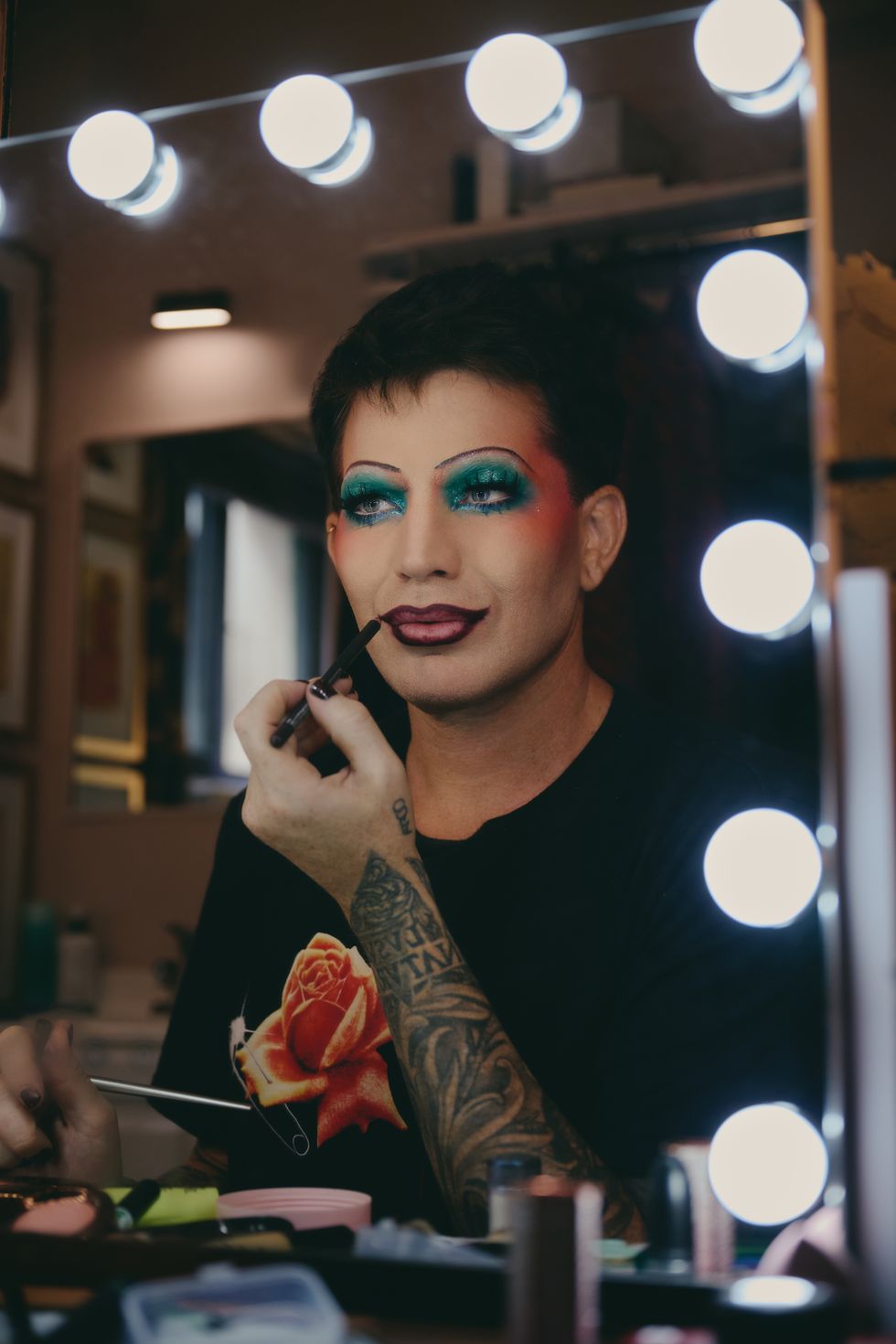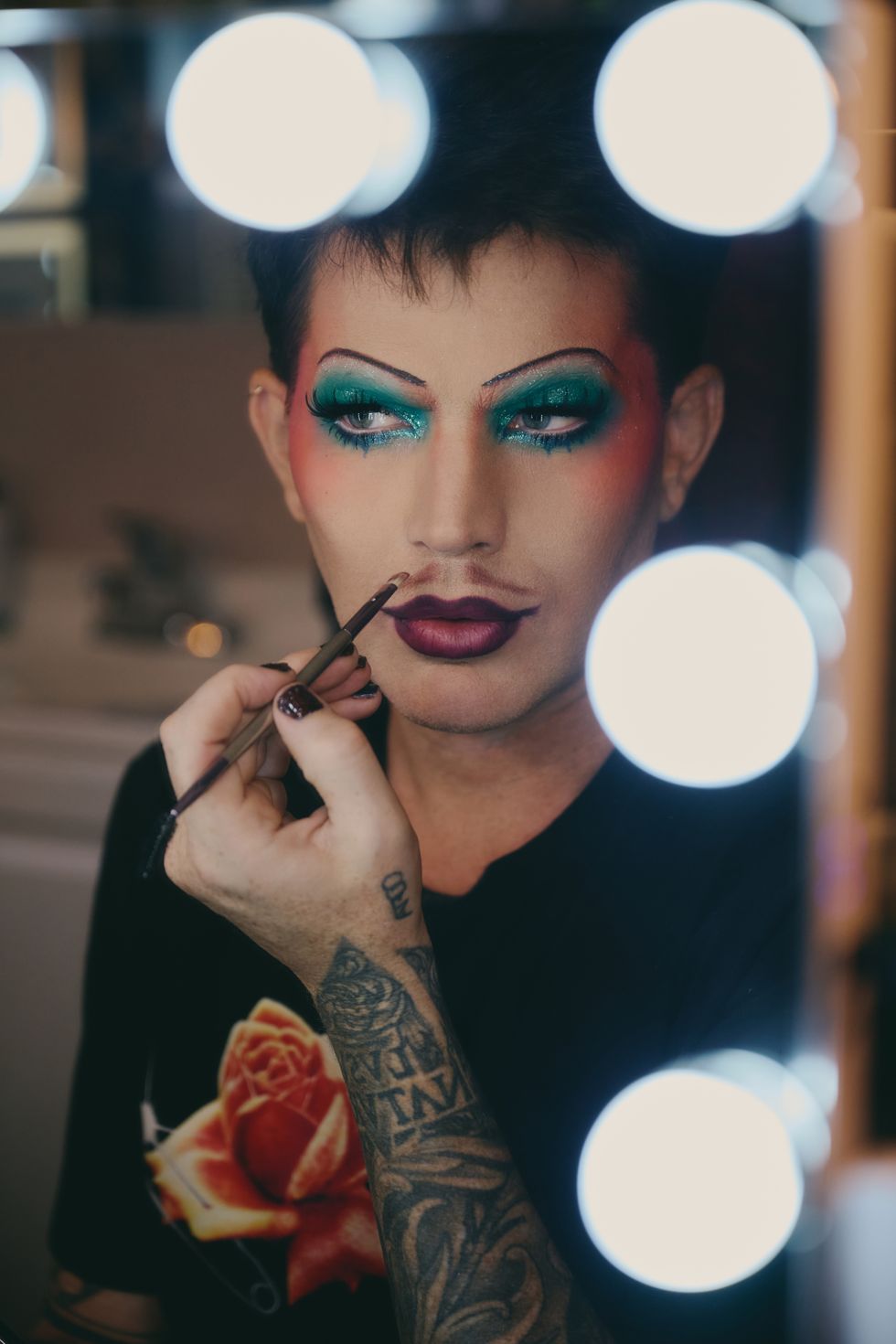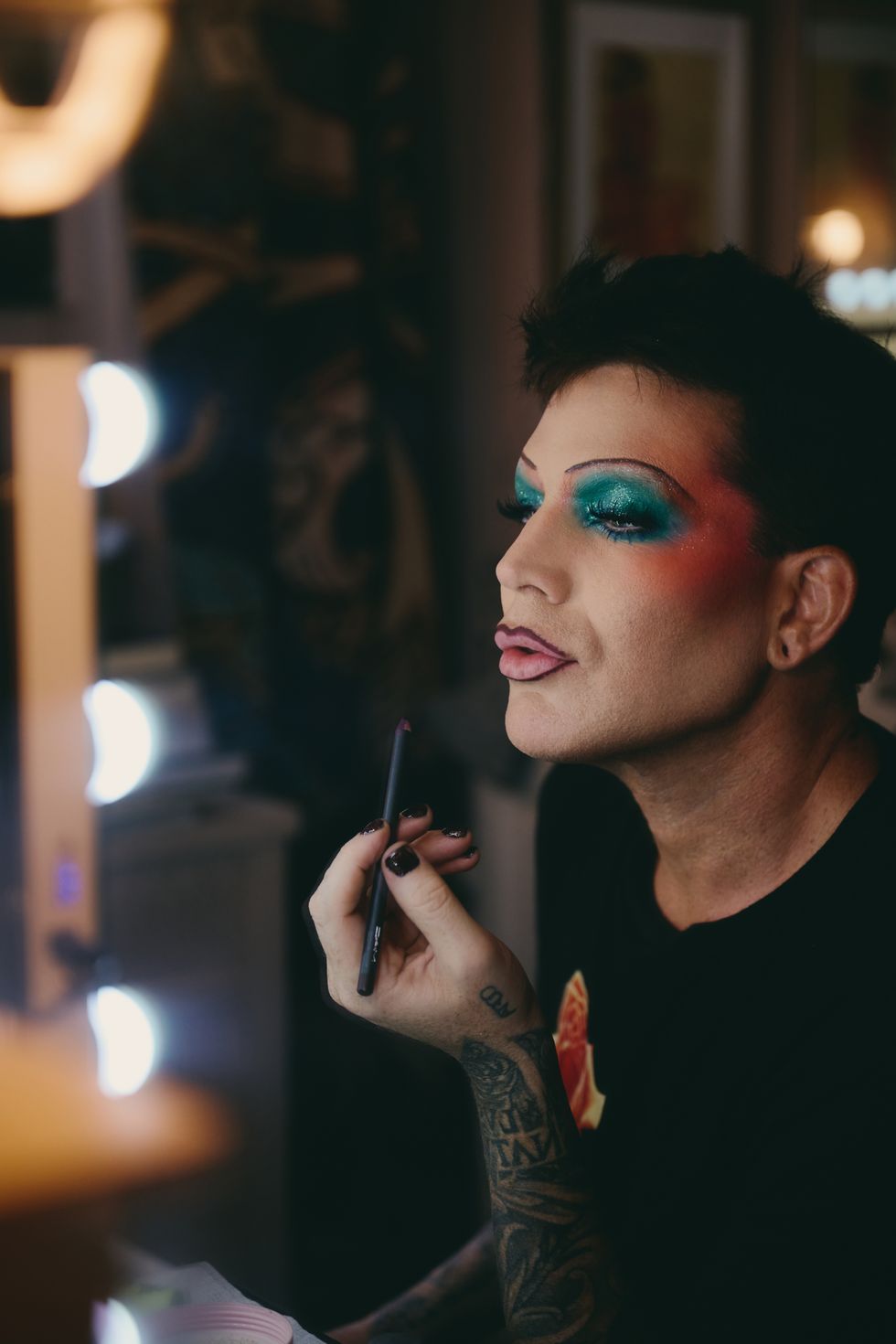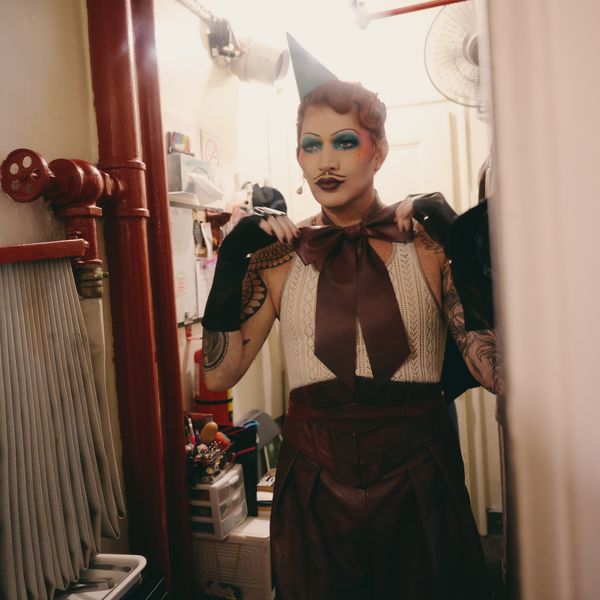
Adam Lambert Makes Broadway Debut in 'Cabaret'
Oct 02, 2024
Just when you think the current Broadway production of Cabaret couldn’t get any gayer, American Idol alum Adam Lambert joins the cast as the Emcee, a legendary symbol of queer visibility, played in the past by Joel Grey, Alan Cumming and, most recently, Eddie Redmayne.
Making his Broadway debut, Lambert not only has the vocal chops to sing some of the most beloved showtunes around — “Willkommen,” “Money” and “If You Could See Her,” to name a few — he also has the face-beating skills to do his own makeup for his opening number.
It’s clear Lambert is having a ball on stage, playing with gender and sexuality, eight times a week. He also recently released Afters, his latest EP that goes on a late-night musical jaunt through a clubby world of sexy fun.
PAPER caught up with Lambert after his first week of performances.
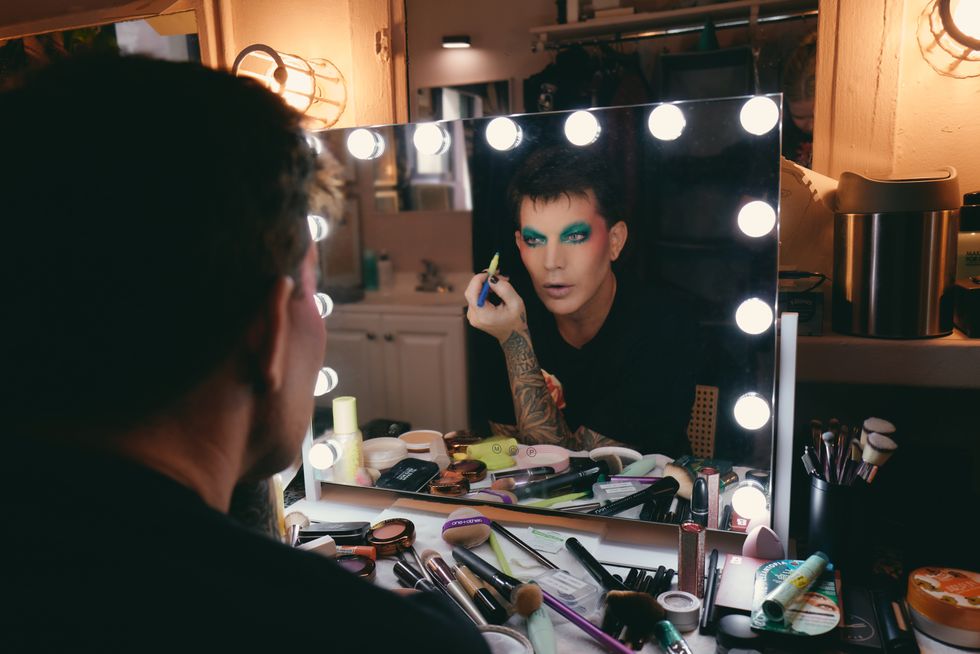
Tell me about your history with Cabaret.
My first voice teacher was a big fan and showed me the movie early on. I think I was probably like 14. She was just like, "Isn't it scandalous?" And it just felt so naughty and edgy, and I was very drawn to that. Big surprise. Still am. I remember performing “Money” with my voice teacher for a recital. The music has been in my wheelhouse for a long time, and my dream roles in the theater have always been sort of the strange roles. And the Emcee has always been on a short list for me. It's like, "Oh, that would be so fun."
This is your Broadway debut, right?
Yeah. It's really interesting. I was doing theater all the way up until I auditioned for American Idol. I was 28 when I did American Idol. Theater was sort of the trajectory I was on. And I wasn't in New York, I was in LA doing theater, and there's not a lot there — but I was doing what I could find. And I always thought, "Oh, one of these days I'm going to move to New York. One of these days when I have the right gig, I'm going." And I was waiting for something to take me. And then I did the national tour of Wicked, and I got to rehearse here in New York. It was a Broadway production, even though it was a tour, and it was rehearsing with a Broadway-caliber creative team and all that. So I was like, "Oh, this is pretty much the same thing. I've sort of made it to Broadway."
I did that for a while, and then Idol happened. I felt like I took that fork in the road and it's been amazing. I've loved recording my own music and being my own artist and working with Queen. But coming back to this, it feels like it's this full-circle moment, and I get to return to a younger alternate reality. You know what I mean? What if I hadn't done that? What would my life have been? And this almost answers that question in a way, and it's really cool.
Berlin in the ‘30s was so decadent. Did you worry at all about a New York crowd in Times Square who’s kind of seen it all, that it would be hard to shock them?
I didn't think about that. You mentioned Berlin in the ‘30s. There was a documentary I saw called The Road to El Dorado, which is so cool. And it talks all about the queer scene in Berlin. And that blew my mind. I hadn't quite realized how progressive it was.
I saw that and I was shocked and impressed.
That’s the cool thing about this production: it captured this idea of a community of people in a nightclub that are able to express themselves and be exactly who they are and be as fluid as they want to be and whatever gender expression they want to have.
I just love the parallels that we have to what was going on in Berlin and in Germany in the early ‘30s. We get to see the sexy, fabulous side of that, and the fact that we have all this fluidity and expression and freedom in Kit Kat Club and all this sexuality. And then you get to the end of act one into act two, and you see all the dark side of what the Nazis brought to Germany and fascism and misogyny and homophobia and all these terrible themes that come up that I feel like we're all looking at dead-on today in 2024. So it's kind of eerily relevant, this show, maybe more than it was 20 years ago.
Totally. What did you think when you first saw the costumes or the makeup test? Did you have any input into how your character looked?
I saw the show in London when it opened. I happened to be there and saw it and I was like, "Oh my God, the aesthetic of this production is so fierce." I love, love all the jewel tones and the dingy lighting and the immersive experience. And I remember thinking to myself, looking at it and looking at the ‘30s influence on the costumes and what they were doing with the makeup and the hair. And I was like, "It's very fashion. It's very much that Margiela, Pat McGrath glass skin experience right now." And when I found out I was going to be doing it, I did get very excited about the makeup. I was like, "Okay, this is going to be really fun." I'm like, "I get a finger wave and I get to draw on pencil eyebrows." I mean, my fantasy is complete.
Perfect. I was stunned at how you had such big transformations in terms of makeup. I mean, you have a full white face at one point. Do you run off stage and they scrub your face with a baby wipe?
Yeah, that is literally a show within itself. There's choreography backstage that's more complicated than the onstage choreography. It's an experience for the skin, let me put it that way. But it's worth it. What makes the character so interesting is that every time he appears he's sort of able to shape-shift. And it's a concept that I think Eddie [Redmayne, who originated the role] was a big part of creating along with the creative team, and that he's sort of this abstract puppet master that is bringing these characters to do his storytelling for the audience.
And by the second half of the show, you start seeing how he uses his ability to transform in order to avoid the oppression of the Nazis. He decides to assimilate and blend into the community. He takes off his makeup, he takes off all the things that make him fabulous and fierce and wears just a drab suit and no makeup. So it's an interesting statement about how we use our outward appearance to express who we are, which is so commonplace now. But I think what happened in the ‘30s in Berlin was that they had to sort of go backwards in order to survive.
Drag Race fans are excited that Marcia Marcia Marcia, also known as Marty, is one of the Kit Kat Club girls. What's it been like working with her?
I was excited too. I'm a big fan of Drag Race, and so when I found out that Marty was in the show, I was like, "No way. That's great!" And they have been completely supportive and wonderful because they also understudy the role. So it's been such a lovely experience stepping into this cast who've been working together for six months and being the new kid. And they've welcomed me with open arms, including Marty, and just been very helpful, very supportive.
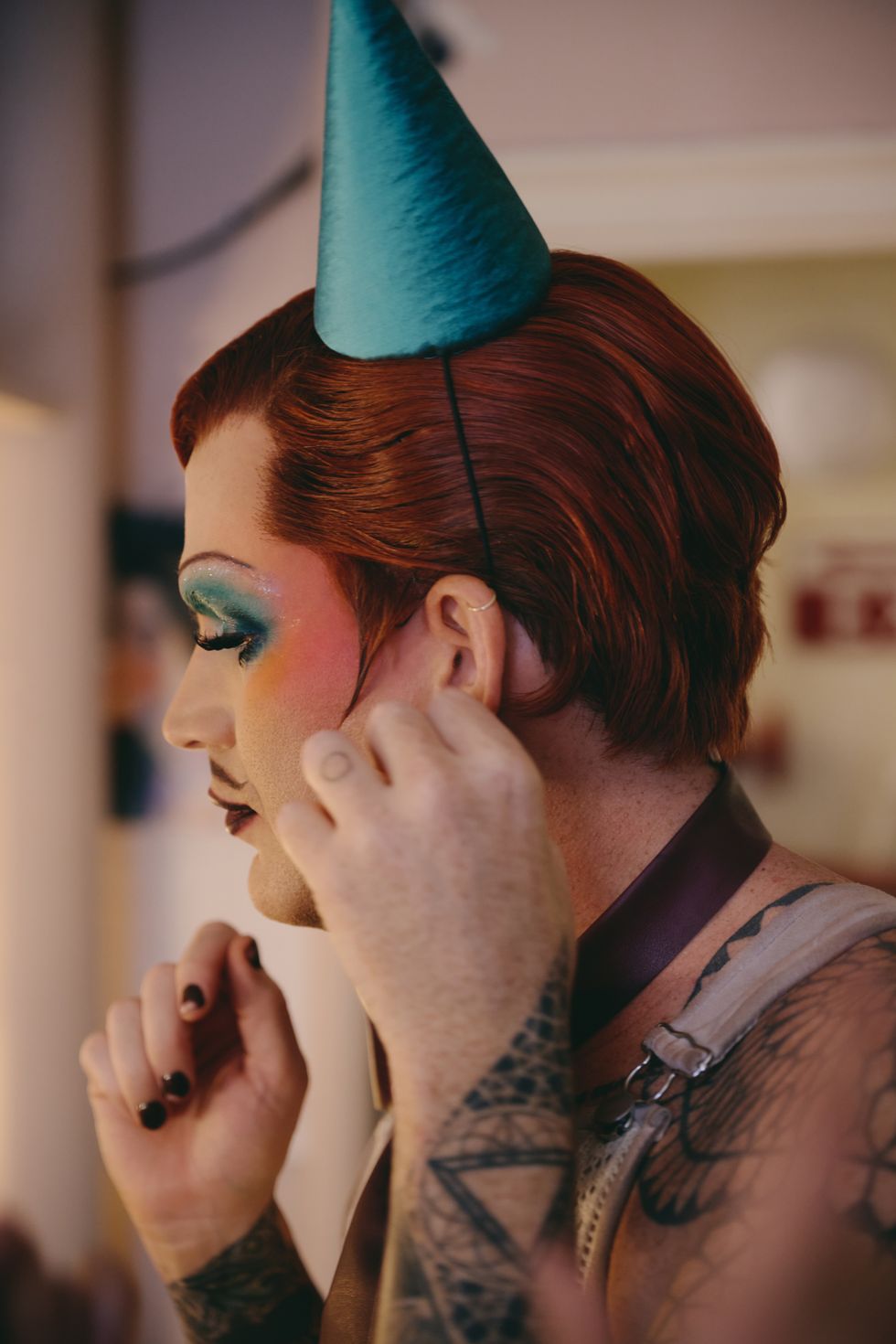
The show has such an incredible score.
The character's a bit schizophrenic in a way, in these different transformations that he goes through scene to scene. It also allows me to transform vocally. There's certain songs that sound completely different, that sit in a different part of my voice than the next one.
There's songs that are really silly and campy, kind of vaudeville style that would exist in a cabaret in the ‘30s. And then there's moments that are really beautiful and more ethereal. And there's a ballad, an 11 o'clock number for me called “I Don't Care Much,” which is sort of a torch song, and that's a whole other thing.
I was singing it around the hotel today.
Yeah, it's such a good song, isn't it? I'm loving it. I'm loving that I get to show some different sides and give the Emcee lots of dimension.
Talk to me about Afters, which is your latest musical release as Adam.
Well, it's so funny, because someone pointed out to me, "It's almost like Cabaret is the 1930s equivalent to what you just did, the kind of stuff you're talking about and singing about." Getting to create songs that are about sex, that are about connection and a dirty good time. And Afters was so much fun to put together. I wanted to do something that would feel at home in a club or an after party, obviously. I wanted it to sound like a party. I wanted it to sound like what my social life sounds like.
It probably won't sound like that over the next six months very often. But over this last summer, I had a lot of fun and I wanted to create the EP to kind of be a soundtrack for Pride and for going to Fire Island and going to all my friends that travel around and go out to different cities and different clubs and have experiences. And so that's what Afters is all about.
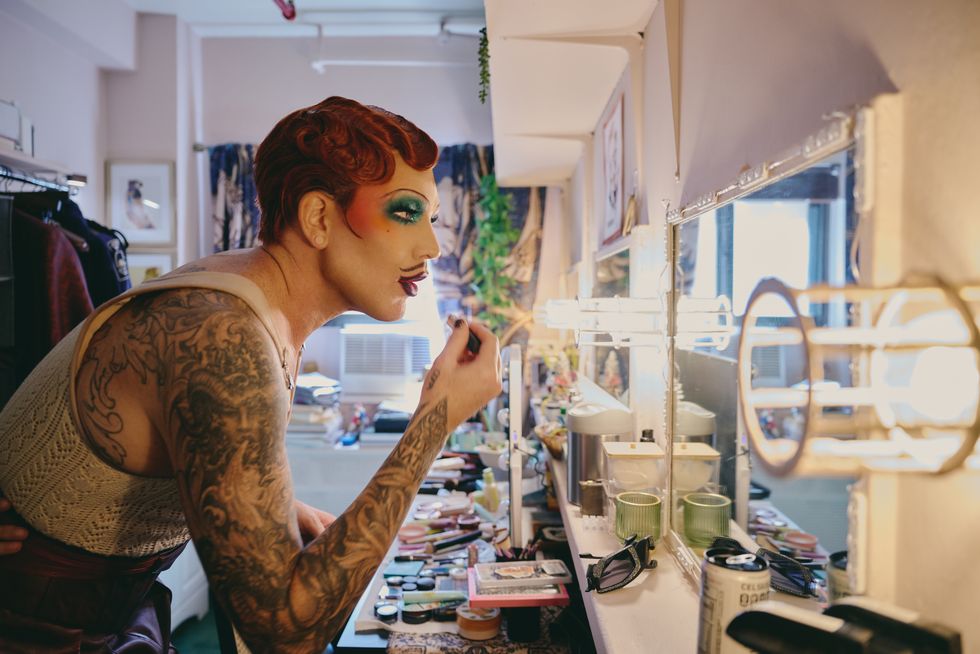
Fabulous. What's your favorite costume or look in the show?
I love the makeup and hair in the first look, and I get to do that. That makeup I do myself. So it gets me in character. That's really fun. The other ones are so fast. I have this brilliant artist, Brian, that's helping me with them. I think that black-and-white costume is pretty stunning in “Money” with the pearls and the skeleton look. That's pretty fabulous.
Yeah, they're all fabulous, I love it.
Photography: Jenny Anderson
Costume design: Tom Scutt
Hair and wig design: Sam Cox
Makeup design: Guy Common
MORE ON PAPER
ATF Story
Madison Beer, Her Way
Photography by Davis Bates / Story by Alaska Riley
Photography by Davis Bates / Story by Alaska Riley
16 January
Entertainment
Cynthia Erivo in Full Bloom
Photography by David LaChapelle / Story by Joan Summers / Styling by Jason Bolden / Makeup by Joanna Simkim / Nails by Shea Osei
Photography by David LaChapelle / Story by Joan Summers / Styling by Jason Bolden / Makeup by Joanna Simkim / Nails by Shea Osei
01 December
Entertainment
Rami Malek Is Certifiably Unserious
Story by Joan Summers / Photography by Adam Powell
Story by Joan Summers / Photography by Adam Powell
14 November
Music
Janelle Monáe, HalloQueen
Story by Ivan Guzman / Photography by Pol Kurucz/ Styling by Alexandra Mandelkorn/ Hair by Nikki Nelms/ Makeup by Sasha Glasser/ Nails by Juan Alvear/ Set design by Krystall Schott
Story by Ivan Guzman / Photography by Pol Kurucz/ Styling by Alexandra Mandelkorn/ Hair by Nikki Nelms/ Makeup by Sasha Glasser/ Nails by Juan Alvear/ Set design by Krystall Schott
27 October
Music
You Don’t Move Cardi B
Story by Erica Campbell / Photography by Jora Frantzis / Styling by Kollin Carter/ Hair by Tokyo Stylez/ Makeup by Erika LaPearl/ Nails by Coca Nguyen/ Set design by Allegra Peyton
Story by Erica Campbell / Photography by Jora Frantzis / Styling by Kollin Carter/ Hair by Tokyo Stylez/ Makeup by Erika LaPearl/ Nails by Coca Nguyen/ Set design by Allegra Peyton
14 October
